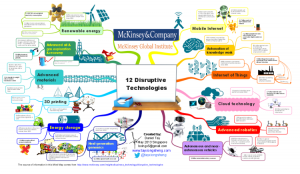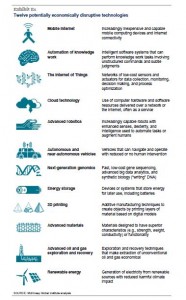According to the McKinsey Global Institute, there are 12 technologies that could drive truly massive economic transformations and disruptions in the coming years. They estimate that applications of the 12 technologies discussed in the report could have a potential economic impact between $14 trillion and $33 trillion a year in 2025.
This holds strong implications for entrepreneurial minds, as disruptive technologies can change the game for businesses by creating avenues for entirely new products and services. Just as collaborative consumption has changed the way we think about travel and tourism, renewable energy and advancements in energy storage can alter the business landscape and allow for newcomers to enter the market and gain traction. To capture the value of these 12 disruptive innovations, we must remain vigilant in our quest to improve through innovation and stay agile in our business models to take advantage of the rapidly changing world around us.
Without further ado, the 12 disruptive innovations are:
- Mobile Internet
- Automation of Knowledge Work
- Internet of Things
- Cloud
- Advanced Robotics
- Autonomous Vehicles
- Next-Generation Genomics
- Energy Storage
- 3D Printing
- Advanced Materials
- Advanced Oil & Gas Exploration
- Renewable Electricity: Solar & Wind
If you don’t have time for the entire 176 page report, be sure to check out the well-designed slide show, that takes you through the 12 trends and offers a glimpse into the component technologies, key applications and vast potential for economic impact.
In addition to these 12 disruptive innovations, they have also identified inventions that will be hyped soon but still need some more research to increase their potential: next-generation nuclear (fission), fusion power, carbon sequestration, advanced water purification, quantum computing, private space flight, OLED / LED lighting, wireless charging, flexible displays, 3D and volumetric displays.
Source: McKinsey publication Disruptive technologies: Advances that will transform life, business, and the global economy








Leave a Reply